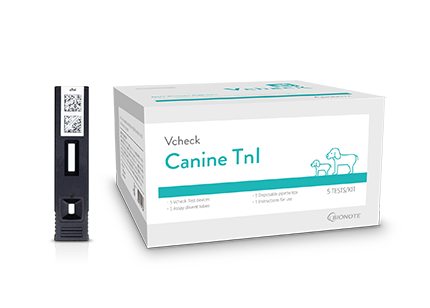
- BIONOTE
- Support
- News
-
Analytically validated Vcheck cCortisol test kit (SCIE journal)
A paper on the analytical validation of Vcheck cCortisol has been published in the international journal, Medycyna Weterynaryjna (Science Citation Index Expanded). See the attached file for the full paper. (Paper: Medycyna Weterynaryjna 77(08):6562-2021) In dogs, serum cortisol concentration can be useful for the diagnosis of adrenal and pituitary disorders. Interpretation of serum cortisol concentration is crucial in the diagnosis and management of dogs with both hyperadrenocorticism and hypoadrenocorticism. In this study conducted at University of Life Sciences in Lublin, Poland, non-fasting blood samples were obtained from 44 dogs. Cortisol results obtained by the Vcheck analyzer were compared to those obtained by the IMMULITE 2000 immunoassay, which had previously been validated for the measurement of serum cortisol concentration in dogs. As a result, Pearson’s Correlation analysis shows a very high consistency of the results obtained by the two analyzers (r=0.94, Fig. 1). The Bland-Altman test of agreement demonstrated that the Vcheck produced results close to those obtained by the reference method (Fig. 2). According to this study, the results of the Vcheck method were comparable to those of the IMMULITE 2000 reference method, which makes it suitable for canine serum cortisol analysis for the diagnosis of adrenal disease. Vcheck cCortisol can be quantitatively measured using a fluorescent immunoassay analyzer, Vcheck, in a short time (20 minutes) and can be tested using a small amount of sample (serum 50 µl). It also has a wide measurement range of 1 to 30 µl/dl.
- 2021.09.06
- Hits : 5,474
-
 BIONOTE to Launch Vcheck Canine TnI Next Month
BIONOTE to Launch Vcheck Canine TnI Next MonthBionote, a leading veterinary diagnostic company based in Korea, is introducing a new biomarker, TnI, as a part of the Vcheck series. Vcheck Canine TnI is an in vitro diagnostic test kit for the quantitative measurement of cardiac Troponin I (TnI) concentration in canine serum. This test kit precisely quantifies the degree of elevation in TnI levels in dogs. Troponin consists of 3 subunits (troponin I, T, and C) which together function as the molecular switch of cardiomyocyte contraction. Among them, cardiac Troponin I (TnI) is a sensitive and specific circulating marker of cardiac injury for dogs. Cardiac injury causes the release of TnI into the circulation, where its concentration is correlated to the severity of the damage. Vcheck Canine TnI can provide important diagnostic and prognostic information in patients with cardiovascular or non-cardiac diseases as a cardiac injury marker of choice. A combined measurement of TnI and NT-proBNP is prognostically superior to measuring each alone in dogs with mitral valve disease (MMVD). NT-proBNP is also one of the Vcheck biomarkers. Vcheck Canine TnI: This one-step test procedure is easy to follow and provides fast results within 10 minutes using serum samples from dogs. Meanwhile, Vcheck Feline TnI, which measures cardiac TnI in feline blood, will be released later this year. If you are interested in Vcheck Canine TnI, please contact your local distributor or mail to [bionote@bionote.co.kr].
- 2021.08.30
- Hits : 10,009
-
FIND and Unitaid invest to support technology transfer and boost local production of COVID-19 Rapid
GENEVA, SWITZERLAND – 15 July 2021. Local manufacturing of COVID-19 rapid tests in Africa and Latin America will be dramatically expanded, thanks to investment from FIND, the global alliance for diagnostics, and Unitaid. Following a call for Expressions of Interest launched under the Access to COVID-19 Tools (ACT)-Accelerator Diagnostics Pillar, contracts have now been finalized to drive equitable access to fit-for-purpose antigen rapid diagnostic tests (Ag RDTs) for COVID-19. The pandemic has exposed how fragile health structures and an exclusive reliance on global supply chains leave many countries without access to the tests they need to control COVID-19. Today, high-income countries are testing people for COVID-19 over 60 times more than low-income countries. Expanded production capacity in local and regional hubs is critical to ensuring that healthcare providers in low- and middle-income countries (LMICs) can implement effective testing strategies to contain the spread of the virus. Agreements have been signed to support collaborations between Xixia Pharmaceuticals (a subsidiary of Viatris) and Guangzhou Wondfo Biotech (Wondfo), DCN Dx and WAMA Diagnóstica, and DIATROPIX of the Institut Pasteur de Dakar, Bionote and Mologic. FIND and Unitaid are supporting the creation of a Centre of Excellence at DCN Dx to facilitate RDT technology transfer to LMIC manufacturers. WAMA Diagnóstica, based in Brazil, is the first of these, and will supply the Latin America and Caribbean region. Test volumes are expected to reach 2 million tests per month, with a ceiling price of US$2.00 (ex-works). To serve the African continent, DIATROPIX of the Institut Pasteur de Dakar in Senegal is being supported to scale up manufacturing of Ag RDTs transferred from Mologic and Bionote. Through this support, diaTROPIX will seek regulatory authorization for the transferred tests and commercialize them under its own brand, with the aim of reaching 2.5 million tests per month by 2022, at prices ranging from US$2.50 to US$2.00 (ex-works) with a view to further reductions in the near future. In a further boost to testing capacity in LMICs, FIND and Unitaid announce that Wondfo, based in Guangzhou, China, is teaming up with Viatris (operating through its subsidiary Xixia Pharmaceuticals based in Gauteng, South Africa) to bring its low-cost Ag RDTs to market in LMICs. This partnership between a high-volume manufacturer and a distributor with global reach has the potential to produce 144 million tests per year, at a ceiling price of US$2.50 (ex-works). Recently released WHO guidance on national SARS-CoV-2 testing strategies emphasises the important role of high-quality Ag RDTs. They remain the primary diagnostic test for detection of active SARS-CoV-2 infection in decentralized settings where timely molecular testing is not available. Marta Fernández Suárez, Senior Director of R&D at FIND, said: “Scaling up testing capacity in LMICs is one of our highest priorities. The EOI process has enabled us to identify partnerships that we believe can have a great impact in key regions that are of critical importance to the pandemic and potentially beyond, to help ensure that everyone who needs a test can get one.” Vincent Bretin, Director of Results at Unitaid, said: “Increasing the capacity of local and regional hubs to produce COVID-19 tests will be vital if we are to ensure truly equitable access to this crucial tool. Currently the vast majority of rapid tests being used in low- and middle-income countries are manufactured in just two countries in one region, so these agreements are an important step in ensuring that countries are equipped to detect cases of COVID-19, helping contain outbreaks and bringing a swifter end to the pandemic.” Announcement of these agreements follows a technical workshop on local production of diagnostics in LMICs, hosted by the World Health Organization, UNDP and FIND, to contribute to the ongoing development of comprehensive and practical measures to catalyse and sustain production of diagnostics in these countries. More details and a recording of the meeting are available here. Original News Link: https://www.finddx.org/newsroom/pr-15jul21/
- 2021.07.19
- Hits : 9,826